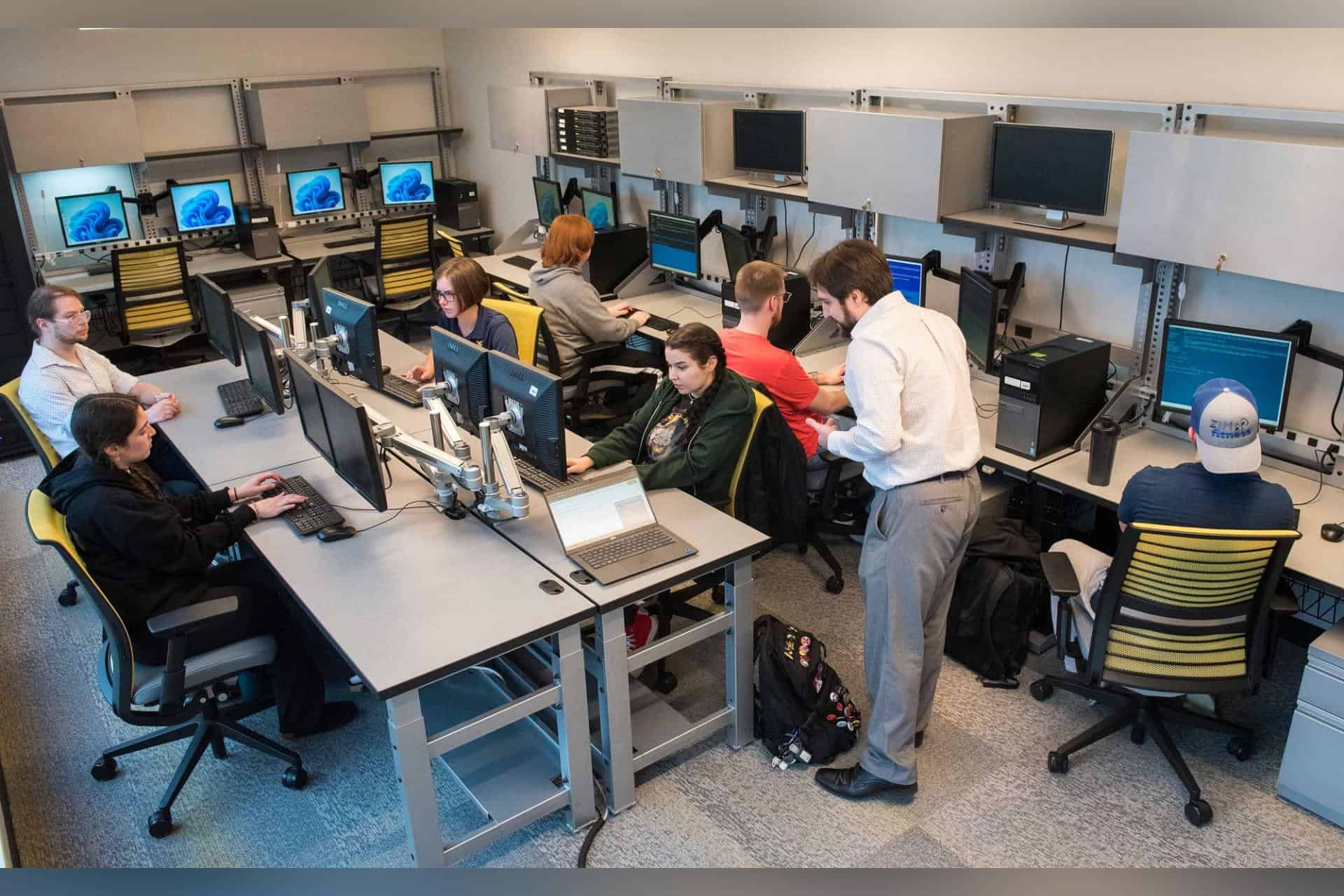This battlefield is not a jungle or desert. Instead, it is a sophisticated office space inside Reynolds Hall, home of the Chambers College of Business and Economics, equipped with workstations, servers, computers and secure networks.
At war are West Virginia University students, engaged in Red Team vs. Blue Team.
In the cybersecurity world, red teams play offense, attempting to attack and break into systems in a live simulation. Blue teams play defense, guarding the network against attacks and threats.
This experiential learning prepares the next generation of cybersecurity experts, a workforce in high demand. Globally, four million cybersecurity roles went unfilled in 2023, according to a study by ISC2, the world’s largest association for cybersecurity professionals.
Across WVU, colleges are staying ahead in a field changing by the second with the latest phishing emails or data breaches.
Chris Ramezan, assistant professor of cybersecurity, oversees the Dr. Randy and Karen S. Evans Cybersecurity Lab, where Red Team vs. Blue Team exercises unfold.
“The best way to understand how to secure a system is to first learn how to break a system,” Ramezan said. “A main purpose of our lab is to provide a space to work on the most nascent cybersecurity threats affecting modern businesses. We’re tackling these problems in multiple ways, such as through research with both graduate and undergraduate students and allowing them to work with real businesses to address their cybersecurity issues.”
Assisting Ramezan in the lab, named for Karen Evans, a WVU alumna and cybersecurity expert who has served under two presidential administrations, is Frank Hatten, a former student in the program.
Hatten joined the Chambers College as a cybersecurity analyst and adjunct professor in 2022 as he completed his master’s degree in business cybersecurity management.
“I saw it as a perfect opportunity to give back to the state and the University,” he said. “I love seeing the students’ faces light up whether they’re at the keyboard figuring something out or physically running cables through a wall.”
Students have worked with several businesses both in and out of the state to solve real-life cybersecurity and technology issues. For example, Bloom, an art shop in Thomas, West Virginia, faced network and Wi-Fi issues due to thick brick walls. Chambers College students assessed, measured and mapped the building before developing a new network architecture.
“Students used software to insert building blueprints and measurements to map out where wireless access points should be for optimal wireless coverage,” Hatten said.
Other businesses receive simple tips and tricks from students to keep their networks secure.
“One business stored all the passwords underneath a keyboard at the front register,” Hatten said. “That’s a big no-no, right? But we find that happens a lot.
“We’ve helped other businesses with their firewalls, analyzing potential security breaches and malware, and better understanding the traffic that flows through their networks.”
Students have even worked with national entities like the U.S. Department of Defense, the MITRE Corporation and Leidos. Kennedy Hawkins, a business cybersecurity management master’s student, said the Evans Lab helped him secure an internship at the Civil-Military Innovation Institute.
“I work in a lab very similar to the Evans Lab at Chambers,” said Hawkins, of West Grove, Pennsylvania. “We work with real-world tools to provide training, innovation and research to the Army National Guard and other government entities. The cybersecurity programs at WVU have prepared me for the future by integrating practical, real-world examples into our training.”
Teaming Up
Since 2006, WVU has held the NSA and the Department of Homeland Security’s designation as a National Center of Academic Excellence in both cyber defense education and research. The Evans Lab serves as WVU’s lead training ground for preparing students for Operation Locked Shields, an international exercise by NATO Cooperative Cyber Defence Centre of Excellence in Tallinn, Estonia. In this live-fire exercise, students enhance their skills in defending national IT systems and infrastructure. During these events, students work with the nation’s top cybersecurity experts.
Ramezan’s work led to him being named the academic lead of the 2024 NATO Locked Shields exercise by the chief of staff of the Joint Force Headquarters. He also helped the U.S. national team earn a 4th place ranking in the 2020 NATO Locked Shields exercise, one of the team’s highest rankings.
Additionally, WVU is among 84 educational institutions working with CYBERCOM, in the U.S. Department of Defense, putting students through realistic simulations. Both computer science and business school majors have access to CYBERCOM’s academic partnership, which includes expertise from eminent cybersecurity experts and prestigious civilian internship opportunities.
“Cybersecurity is the fastest growing degree program in our department,” said Anurag Srivastava, professor and chair of the Lane Department of Computer Science and Electrical Engineering at the Benjamin M. Statler College of Engineering and Mineral Resources. “Engagement like the opportunity with CYBERCOM allows us to show students at least one very good application for what they are learning in classes: to help with national defense.”
As software, systems and network threats become more sophisticated, collaboration between the Statler and Chambers colleges is vital to stamp out attacks.
“Our students want more choices, more electives, including business classes at Chambers,” Srivastava said. “We usually look at the infrastructure and operational side and they look at the business and information side.”
Srivastava said students want to learn from one another. Working together enhances leadership and teamwork skills. In one Locked Shields competition, WVU students from engineering, business, law and media worked with the West Virginia National Guard and Polish allies to defend a fictional country, leading the team to its highest ranking.
Home on the Range
At the Statler College, researchers are planning a cybersecurity range, a specialized software and hardware facility for education, training and research, supported by the U.S. Department of Education.
The facility will serve as a “sandbox,” a network-isolated environment emulating an operating system for users. It safely runs experiments without risking security threats, preventing malicious activities from spreading.
“Everything is done securely and responsibly. For cybersecurity we must include hands-on experiences for students which will experiment with malware,” said Katerina Goseva-Popstojanova, a professor in the Lane Department of Computer Science and Electrical Engineering who oversees the facility.
Part of the cyber range will be hosted on an AWS Outpost, allowing for research and teaching. An AWS Outpost, from Amazon Web Services, is a platform enabling users to set up a hybrid cloud by extending AWS infrastructure to any facility.
The range will serve as an operations center for networking internet of things (IoT) devices. IoT devices, like sensors and gadgets, are programmed for applications that transmit data via networks. Goseva-Popstojanova emphasized support and funding for these projects are crucial for the future, allowing research with the latest technology.
“There is such a great need for cybersecurity experts in many industries,” she said. “There are many unfilled positions. Students with hands-on experience in cutting-edge technology are prepared for successful careers.”
Goseva-Popstojanova joined WVU in 2001 when no cybersecurity classes were offered. The first came two years later. She has since played a key role in cybersecurity research and teaching. She received $1 million from the National Science Foundation to provide scholarships for 40 undergraduate students for a project called “Attracting and Cultivating Cybersecurity Experts and Scholars through Scholarships.”
A project goal is to encourage diversity, including women, in STEM fields.
“In general, there are not very many females or minorities in STEM,” Goseva-Popstojanova said. “We’re committed to increasing the number of women and underrepresented groups attaining degrees in cybersecurity. This serves a broader impact on society.”

















